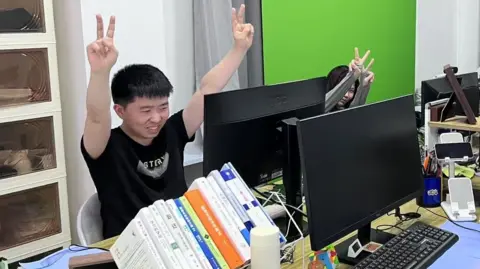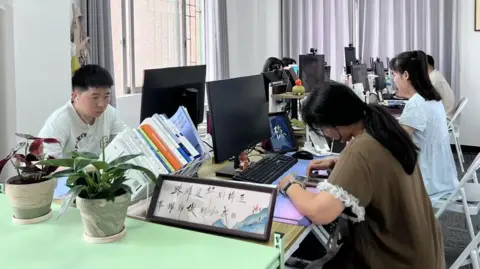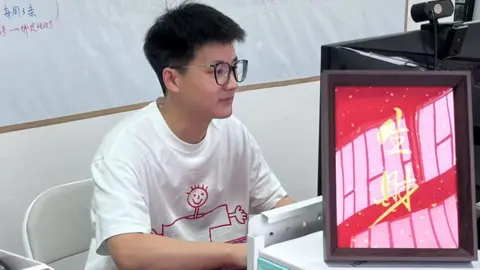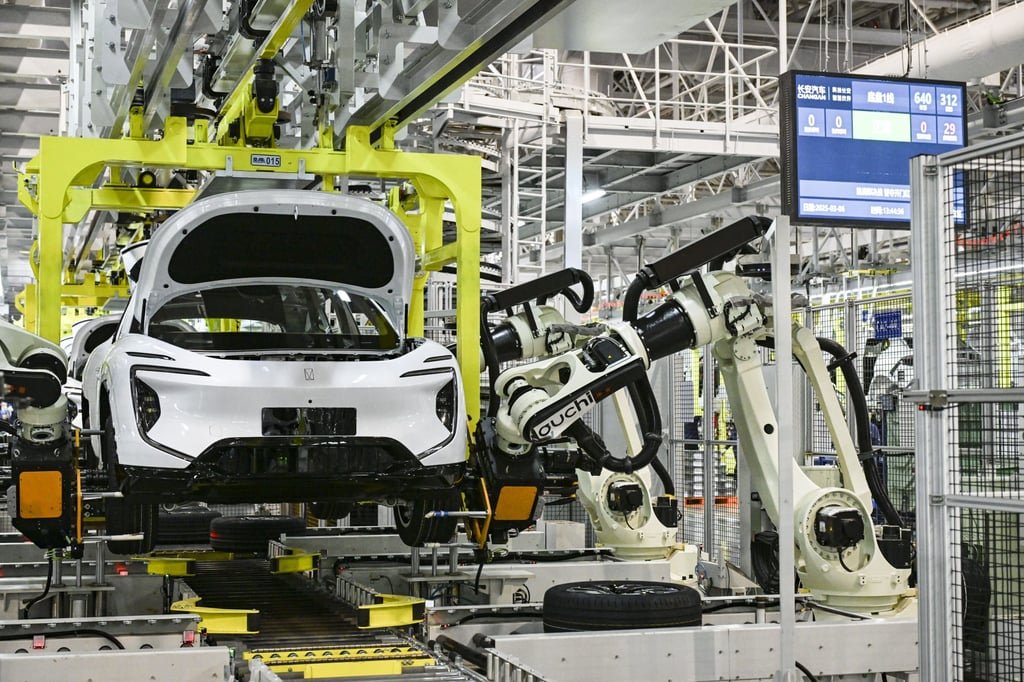BBC News Chinese, Hong Kong

 BBC
BBCNo-one would want to work without getting a salary, or even worse – having to pay to be there.
Yet paying companies so you can pretend to work for them has become popular among young, unemployed adults in China. It has led to a growing number of such providers.
The development comes amid China’s sluggish economy and jobs market. Chinese youth unemployment remains stubbornly high, at more than 14%.
With real jobs increasingly hard to come by, some young adults would rather pay to go into an office than be just stuck at home.
Shui Zhou, 30, had a food business venture that failed in 2024. In April of this year, he started to pay 30 yuan ($4.20; £3.10) per day to go into a mock-up office run by a business called Pretend To Work Company, in the city of Dongguan, 114 km (71 miles) north of Hong Kong.
There he joins five “colleagues” who are doing the same thing.
“I feel very happy,” says Mr Zhou. “It’s like we’re working together as a group.”
Such operations are now appearing in major cities across China, including Shenzhen, Shanghai, Nanjing, Wuhan, Chengdu, and Kunming. More often they look like fully-functional offices, and are equipped with computers, internet access, meeting rooms, and tea rooms.
And rather than attendees just sitting around, they can use the computers to search for jobs, or to try to launch their own start-up businesses. Sometimes the daily fee, usually between 30 and 50 yuan, includes lunch, snacks and drinks.


Dr Christian Yao, a senior lecturer at Victoria University of Wellington’s School of Management in New Zealand, is an expert on the Chinese economy.
“The phenomenon of pretending to work is now very common,” he says. “Due to economic transformation and the mismatch between education and the job market, young people need these places to think about their next steps, or to do odd jobs as a transition.
“Pretend office companies are one of the transitional solutions.”
Mr Zhou came across the Pretend To Work Company while browsing social media site Xiaohongshu. He says he felt that the office environment would improve his self-discipline. He has now been there for more than three months.
Mr Zhou sent photos of the office to his parents, and he says they feel much more at ease about his lack of employment.
While attendees can arrive and leave whenever they want, Mr Zhou usually gets to the office between 8am and 9am. Sometimes he doesn’t leave until 11pm, only departing after the manager of the business has left.
He adds that the other people there are now like friends. He says that when someone is busy, such as job hunting, they work hard, but when they have free time they chat, joke about, and play games. And they often have dinner together after work.
Mr Zhou says that he likes this team building, and that he is much happier than before he joined.
In Shanghai, Xiaowen Tang rented a workstation at a pretend work company in Shanghai for a month earlier this year. The 23-year-old graduated from university last year and hasn’t found a full-time job yet.
Her university has an unwritten rule that students must sign an employment contract or provide proof of internship within one year of graduation; otherwise, they won’t receive a diploma.
She sent the office scene to the school as proof of her internship. In reality, she paid the daily fee, and sat in the office writing online novels to earn some pocket money.
“If you’re going to fake it, just fake it to the end,” says Ms Tang.
Dr Biao Xiang, director of the Max Planck Institute for Social Anthropology in Germany, says that China’s pretending to work trend comes from a “sense of frustration and powerlessness” regarding a lack of job opportunities.
“Pretending to work is a shell that young people find for themselves, creating a slight distance from mainstream society and giving themselves a little space.”
The owner of the Pretend To Work Company in the city of Dongguan is 30-year-old Feiyu (a pseudonym). “What I’m selling isn’t a workstation, but the dignity of not being a useless person,” he says.
He himself has been unemployed in the past, after a previous retail business that he owned had to close during the Covid pandemic. “I was very depressed and a bit self-destructive,” he recalls. “You wanted to turn the tide, but you were powerless.”
In April of this year he started to advertise Pretend To Work, and within a month all the workstations were full. Would-be new joiners have to apply.
Feiyu say that 40% of customers are recent university graduates who come to take photos to prove their internship experience to their former tutors. While a small number of them come to help deal with pressure from their parents.
The other 60% are freelancers, many of whom are digital nomads, including those working for big ecommerce firms, and cyberspace writers. The average age is around 30, with the youngest being 25.


Officially, these workers are referred to as “flexible employment professionals”, a grouping that also includes ride-hailing and trucker drivers.
Over the longer term Feiyu says it is questionable whether the business will remain profitable. Instead he likes to view it more as a social experiment.
“It uses lies to maintain respectability, but it allows some people to find the truth,” he says. “If we only help users prolong their acting skills we are complicit in a gentle deception.
“Only by helping them transform their fake workplace into a real starting point can this social experiment truly live up to its promise.”
Mr Zhou is now spending most of his time improving his AI skills. He says he’s noticed that some companies are specifying proficiency in AI tools when recruiting. So he thinks gaining such AI skills “will make it easier” for him to find a full-time job.






